FAQ: Master’s Degree in School Counseling Online

A master’s degree in school counseling prepares teachers and other education professionals for a number of important roles on K-12 campuses. Your job as a counselor may be limited to specific duties, such as helping students plan for college or explore careers. Or, you might take on the range of responsibilities involved with supporting students who face social, emotional or academic challenges. You may also be called on to help your school community deal with conflict or tragedy, and heal in its aftermath. It all depends on the part you want to play in the lives of your students.
If you’re thinking of becoming a school counselor, just follow the links below to learn more. You can explore program requirements, certifications and career options. You’ll also learn why so many educators are pursuing this degree.
What Is a Master of Education in School Counseling?

A master’s program in school counseling prepares you to contribute to student well-being and success in a number of ways. You’ll learn the purpose and goals of school counseling and study its different forms. You’ll gain management and leadership skills, work with individual students and groups, and learn the ethical standards and legal practices of the profession. Coursework and field experience will also help you develop the knowledge required to create school counseling programs that meet the needs of a diverse student population.
Some graduates with this degree also work in administration at the school or district level, overseeing school counselors or similar programs and services. In all aspects of their work, school counselors focus on planning, prevention, intervention and resolution, with the goal of meeting their students’ needs.
Lamar University’s online Master of Education in Counseling and Development with a Specialization in Professional School Counseling offers educators a fast and flexible path to a new career in this growing profession. The degree program also prepares students for board certification as a Licensed Professional Counselor (LPC) capable of working with all age groups, in addition to Texas School Counseling Certification.
Is a Master of Arts in School Counseling the Same as a Master of Education in School Counseling?
While a Master of Arts (MA) can prepare you for this career field, it is not completely equivalent to the Master of Education (M.Ed.) academically. M.Ed. curriculum in school counseling is often more advanced because it is designed to help teachers and other educators develop specialized knowledge in counseling practices that can build on their K-12 experience. M.Ed. programs may have additional opportunities for capstone or practicum-based learning as well. Some Master of Arts programs also do not dive as deep into standards and competencies, personnel management and finance as Master of Education programs do, but degree requirements will vary.
Do I Need Classroom Teaching Experience to Become a School Counselor?
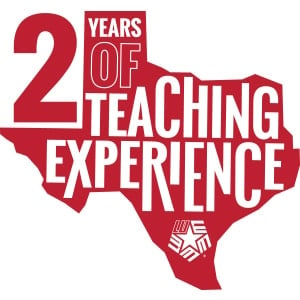
It depends on the state where you want to work. Here are some examples that demonstrate how requirements can change across the nation, according to June 2021 information provided by the American School Counselor Association:
- Texas requires that candidates for school counseling licensure have at least two years of classroom teaching experience.
- New York waives the teaching experience requirement for candidates who hold national school counselor certification.
- Some states have no teaching experience requirement. They include Alaska, North Carolina and West Virginia.
Contact your state education agency for further information.
Lamar University provides information about degree program approval and licensure compatibility for all education master’s programs offered out-of-state to help students living beyond Texas determine whether the coursework will match standards and requirements for school counselors in their state.
What Can I Learn in a School Counseling Master’s Program?
Master’s degrees in school counseling focus on helping educators develop the specific knowledge and competencies required for licensure in their state. You’ll study the fundamentals of human growth and development and begin to understand how they can apply to behavior or influence mental health.
You’ll also learn about counseling as a practice, studying the theory, philosophy, technique, cultural competencies and standards of the profession. Learning opportunities such as practicums and internships also give you a chance to gain valuable experience in settings where you may work after graduation and with the range of students you may serve.
Lamar University’s online M.Ed. in Counseling and Development with a Specialization in Professional School Counseling prepares graduates to meet all certification standards for school counselors in the State of Texas.
“I knew therapy dogs were helping, and I also knew a master’s degree would give me the credibility to make my case. … Lamar provided me the opportunity to take something that I saw as a vision and allowed me to make it happen. I would not be where I am today without my master’s degree.”
What Classes Will I Take for a Master’s in School Counseling?
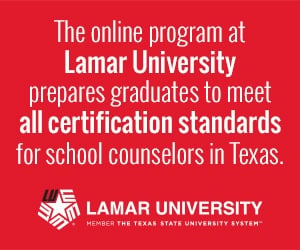
- Human growth and development (physical, intellectual, emotional and social)
- Counseling theory
- Individual and group counseling
- Social and cultural foundations of counseling
- Testing and appraisal in counseling
- Research and program evaluation
- Professional orientation and career development
- Supervised practicum and internship experience

“The courses offered at Lamar University prepared me to be an effective counselor.”
– Patrice Carhart, 2015 graduate of Lamar University’s online Master of Education in Counseling and Development with a Specialization in Professional School Counseling program
What Are the Admission Requirements for Online MSN Programs in Nursing Administration?

Requirements will differ by program, but here are the items most online master’s in school counseling programs ask for to begin evaluating your application:
- A valid teaching certificate, along with verification of your teaching experience
- Documentation of teaching experience or other education employment (district service records, for example)
- A bachelor’s degree from an accredited college or university
- Official transcripts (that include GPA) from each undergraduate and graduate program you’ve attended
If your state does not require teaching certification/experience as a condition of school counselor licensure, those requirements may be waived.
Lamar University has some additional requirements as well:
- A reference letter from your principal or assistant principal
- A departmental application, including personal essays
- At least two years of teaching experience (verified through service records)
- A 2.75 or higher GPA, based on all courses completed for the bachelor’s degree
Students who have completed graduate-level coursework previously may ask for those grades to be considered.
If you are seeking certification in Texas, you’ll also need to complete an internship at a K-12 campus approved by the TEA or Texas Private School Accreditation Commission. See the complete admission requirements for additional information.
Will I Have to Submit GRE Scores?
Should My Online School Counseling Degree Be Accredited?

How Does Accreditation Benefit Students?

Accreditation benefits students in many important ways. It helps ensure that your master’s program in school counseling is using the right methods and information to prepare you for certification, for example. It also gives you access to resources you need during school and after you graduate. You must attend an accredited school or degree program to be eligible for federal and state financial aid, and for loan forgiveness programs available to educators after graduation. Most school districts also require counseling applicants to have a master’s degree from an accredited college or university.
Spotlight: The School Counselor’s Role and Responsibilities

- Identify at-risk students and provide counseling services that address their needs (including dropout prevention, behavioral support, abuse counseling and referral and more).
- Identify students with disabilities, gifted and talented students, and those who are educationally disadvantaged, who may need modified instruction or accommodation.
- Work with school staff, teachers and administrators to interpret standardized test results, assessment data and other performance indicators, and support academic success.
- Provide college advising on issues such as grades and prerequisite courses, admissions, financial aid and early college credit through options such as advanced placement and dual credit courses.
- Provide career advising, helping students assess the job market, explore career paths and salaries, and research potential education or certifications required.
- Address bullying, harassment, fighting and other conflicts between students, serving as an impartial resource for students and parents.
- Provide support to address suicide prevention, substance abuse and mental health issues, making appropriate referrals to community-based treatment or counseling services in consultation with the student’s parent or guardian.
- Consult with school staff, parents and community members to increase education effectiveness and coordinate resources needed outside the classroom to support student success.

“I wanted to help [students] remain in school, because I teach on a 60-75 percent Title I, low socio-economic campus. My role was a counselor in the classroom, as well.”
“Personally, I never dreamed of earning a master’s degree. I was content being a high school Spanish teacher … when I discovered Lamar University and the whole program offered online, I decided to invest further into my education and in turn am now able to help students in a whole new way.”

Is the Role of a School Counselor and Licensed Professional Counselor Similar?
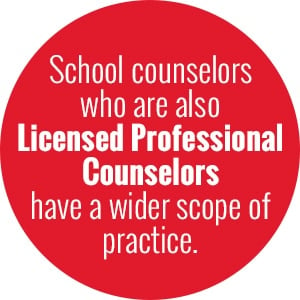
School counselors work primarily with K-12 students, and the scope of their licensure is limited in the area of mental health. They can complete an initial assessment and offer support to students dealing with emotional or behavioral challenges, but they must refer the student to a mental health professional for anything further. A Licensed Professional Counselor (LPC) performs mental health counseling services for people of all ages.
School counselors who are also licensed as LPCs have a wider scope of practice, and are qualified to address deeper emotional concerns students may have. They can provide mental health counseling to children and youth who are dealing with depression, trauma or substance abuse, for example. LPCs can also provide grief counseling in the aftermath of major life events, such as the death of a classmate or parent.
For further information on this subject, check out the American Counseling Association’s Tips for School Counselors Seeking LPC Licensure.
School Counselor Practicum vs. Internship: What’s the Difference?

The internship period provides an opportunity for more intensive counseling practice and mentorship in an actual school setting, building your competency and confidence as you work with students directly. You may also get experience working with the school administrators to help shape counseling services and resources or ensure they meet student needs.
The definition of practicum and internship for school counselors can at times differ by state, as can the activities and timeline involved. Some states have clock-hour requirements for one or both of those elements, for instance, while others leave practice requirements to each degree program’s discretion.
How Does an Online School Counseling Practicum Work?
A school counseling practicum works much the same way online as it does on campus. Students begin applying the knowledge and skills they’ve learned and gain direct experience in counseling under the supervision of professors and other professionals in the field.
At Lamar University, online Master of Education in Counseling and Development with a Specialization in Professional School Counseling students complete a 15-week, 100-hour school counseling practicum that includes 40 hours of direct counseling work. They receive guidance and feedback throughout the practicum, in the form of weekly supervision meetings with their professor and a qualified field supervisor who observes their work with children and/or youth in a school setting. Students also have the benefit of an instructional associate for support.
Students move on to the internship component after successfully completing all course requirements, including observations. Students will not be awarded a grade unless all formal observations, interactive conferences, group and site supervision meetings, assignments and other course requirements are complete and all documentation is submitted to TK20.
“When I did my practicum…I was working with our lead counselor at Skyline doing a lot of things that we do in theater, like role playing. The lead counselor had me do some of the things that I will do in counseling, like giving students an opportunity to practice what they want to say to someone like their parents.”


“I had a site supervisor, a field supervisor and a mentor. As I was learning this information, I had people I could rely on to bounce ideas off of and check and say, ‘What do you think about this situation?’ … They were great about helping guide me. I had the training wheels on. At the same time, I was out there on my own.”
Where Can I Do My Internship?

Many master’s in school counseling programs, including the online M.Ed. in Counseling and Development at Lamar University, allow graduate students to do their internship at the K-12 campus where they currently work.
Students studying online typically arrange their own site and field supervisor, with the assistance of professors as needed. This helps ensure that the experience is both convenient and relevant to the student’s area of interest.
Your master’s program must approve all arrangements before the internship can begin, however, and it must also meet your state’s criteria for field work in school counseling.
How Much Time Is Required to Complete a School Counseling Internship?

- Weekly one-hour meetings with the site supervisor
- One to one-and-a-half hours of mandatory weekly group supervision with faculty supervisor
- Two 45-minute formal observations
- Two internship pre-conferences
- Two post-internship interactive conferences
- Completed assignments, pretest, reflections and documentation
Is There a Residency Requirement If My Classes Are Online?
Many online master’s programs in school counseling offer a brief residency for their students. It is fundamentally different from a practicum or internship, however. During residency, students spend a concentrated period of time working with professors and peers on campus. Students do group projects, improve their counseling and advising skills, and receive direct feedback that they can use moving forward in their practice.
At Lamar University, school counseling master’s students complete a one-week residency during the course of the degree program. Residencies are held on campus once in the fall and spring, and twice each summer to accommodate teacher work schedules. Occasionally, they are held in other locations in Texas in conjunction with professional meetings or conferences for school counselors.
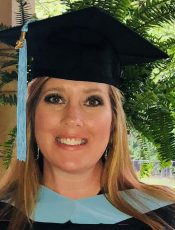
“The reason I enjoyed [the residency] so much, besides the fact that we were with our peers and were practicing everything we had been reading about, was that the experience was so great. … Even though I chose the program because it was online and for the flexibility, I walked away with some friendships that through this past year really helped me get through the program as a support system.”
How Do I Become a Certified School Counselor?
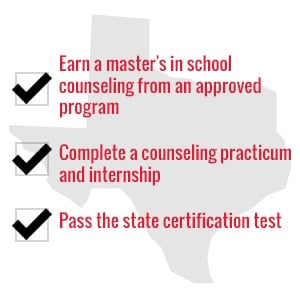
Every state has its own requirements for teachers and other educators seeking certification as a school counselor. The process in Texas is similar to what you’ll find in many states.
You must earn a master’s in school counseling from a degree program approved by the state education agency, complete a counseling practicum and internship, and earn a passing score on the state’s certification test. The TExES School Counselor (152) exam consists of 100 questions covering a range of standards and competencies within the school counselor’s role. A score of 240 is required for certification.
Candidates must also have two years of classroom teaching experience for Texas certification, but that doesn’t apply to all states. The fact that certification requirements like this can vary means you also have to be careful when choosing a master’s program in school counseling. If the curriculum does not meet your state education agency’s specific requirements for school counselor courses, practicums or internships, the degree program might not work for you.
How Do I Find School Counselor Licensing Requirements for My State?
What Is License Reciprocity?

Once you become a professional school counselor, you may be able to take advantage of license reciprocity, also known as license portability. This is a policy that allows school counselors licensed in one state to receive an equivalent license in another, based on their existing qualifications.
Currently, 42 states provide some form of license reciprocity for school counselors. Most offer it unconditionally, but a handful have special conditions, or exclusions for certain states. See the American Counseling Association’s Licensure Portability Model to see a primer on the subject and to learn more about advocacy efforts to create better license reciprocity for school counselors.
Does It Take Longer to Become an LPC Than a School Counselor?

- Master’s students in counseling must complete a practicum that includes at least 300 clock hours of supervised practice experience (with 100 hours direct client contact).
- After earning a master’s degree from an accredited counseling program, graduates must pass the National Counselor Exam and the Texas Jurisprudence Exam before they can apply for their postgraduate certificate (a temporary LPC license), and begin their internship.
- The LPC internship period must last a minimum of 18 months, and 3,000 clock hours. At least half of those hours must include direct contact with counseling clients.
Can My Work As a School Counselor Count Toward My LPC Hours?
How Do I Find LPC Licensing Requirements for My State?
What Is the Career Outlook for School Counselors?
The U.S. Bureau of Labor Statistics expects steady job growth for school counselors through 2029 due to increased K-12 enrollment and other factors. April 2021 labor market analysis by Burning Glass Technologies projects that employment will rise by 13% nationally through 2030, while the following states see even stronger growth during that period.
| Colorado | 23% |
| Texas | 21% |
| Florida | 18% |
| Arizona | 17% |
| Idaho | 16% |
| South Carolina | 15% |
Demand for school counselors is strong in many areas of the country, especially in states with mandates requiring that K-12 students are provided access to counseling services on campus. Half of all states now require school counseling services for students in grades K-8, and the majority of states require services for students in grades 9-12.
Many school districts are also hiring additional counseling staff to meet critical student support needs and address achievement gaps associated with poverty, homelessness and other social issues that impact a student’s ability to learn or stay in school.
Will School Districts Accept a Master’s in School Counseling I Earned Online?

“I chose an online program because of how convenient it was for me, especially being a single mom and having a high school-aged kid. … I could arrange my assignments and my study time around my work schedule and my son’s extracurricular schedule.”
– Patrice Carhart, 2015 graduate of Lamar University’s online Master of Education in Counseling and Development with a Specialization in Professional School Counseling program
“My online experience at Lamar was phenomenal. I had very great professors that were always there for me. They supported me throughout the entire process. It was one of the best decisions that I have ever made, becoming a student at Lamar University.”
Where Can School Counselors Earn the Most?

Location is one of the biggest factors affecting a school counselor’s salary. School districts in major cities or affluent suburbs sometimes have the most resources to devote to counseling programs and individual student support. But it’s possible to earn a satisfying paycheck even in a smaller city or a rural setting.
When you’re not living in a large metropolitan area, housing and other costs of living can be less, so your salary may go farther. Keep this in mind as you consider the following table, which demonstrates how compensation for school counselors in Texas can differ by location.
| Texas School District | Counselor Salaries | ||
|---|---|---|---|
| Low | Average | High | |
| Arlington | $63,139 | $82,425 | $103,710 |
| Houston | $57,869 | $80,020 | $102,171 |
| Coppell | $62,735 | $81,574 | $100,412 |
| Weatherford | $52,342 | $73,851 | $99,359 |
| Round Rock | $55,522 | $74,229 | $92,935 |
| Eanes | $52,987 | $66,368 | $79,749 |
| Huntsville | $51,150 | $63,862 | $76,574 |
| Lubbock | $52,900 | $61,890 | $70,880 |
Source: District salary schedules for 2021-2022
Your experience and service record also matter, of course. School counselors new to the profession will see their salaries rise in most districts based on the number of years they have served in that role.
Are School Counselors With Mental Health Certification in Demand?

Do School Counselors With an LPC Credential Earn More?
In some school districts, school counselors who are also LPCs can earn more. However, the credential itself does not always come with a pay bump. Often, it is the additional counseling experience you have and the wider scope of responsibilities you can take on with an LPC that enables you to earn more in salary. An LPC can also help you qualify for a higher-paying position coordinating or supervising the work of other school counselors, or a mental health consulting role with school districts or private clients.
How Much Does a Master’s in School Counseling Cost?
Cost varies widely depending on your program, the number of credit hours required and whether you are attending a public, private or for-profit institution. Your residency status is also a factor at many schools.
The table below also illustrates potential differences between programs, and what you may encounter in terms of tuition cost when comparing school counselor master’s degrees across Texas. Note that most 48-hour programs do not include the extra LPC coursework.
| Institution | Tuition Per Credit Hour |
Hours Required |
Estimated Total Tuition |
Degree Format | |
|---|---|---|---|---|---|
| University of Houston | $489.41 In-State $997.41 Out-of-State |
60 | $29,365 In-State $59,845 Out-of-State |
Campus | |
| University of St Thomas |
$500* | 48-60 | $28,704-$30,000 | Online | |
| University of North Texas | $332.79 In-State $791.79 Out-of-State |
60 | $19,967 In-State $47,504 Out-of-State |
Campus | |
| Lamar University |
$324.29* | 60 | $19,469.40 | Online | |
* Includes distance learning fees

“When I was thinking about going back to school, I had so many doubts. I didn’t know if I would be able to afford it or be able to ‘get back in the swing’ of being in school after several years. However, Lamar University was such a pleasant experience for me. The program was affordable and I excelled in every class. I learned from my experience at Lamar to step out on faith and follow your dreams.”
“Several co-workers had already begun the program through Lamar University, and I had heard them talking about it. The prospect of completing the whole program online and the cost were both appealing to me. One of my dear friends asked me if I wanted to start the journey with her and we both got registered and went for it!”

Is Financial Aid Available to Online Students?
If I Have Military Education Benefits, Can I Use Them for an Online Degree?

Yes. The Department of Defense and Department of Veterans Affairs will allow you to use your military education benefits for an online master’s in school counseling, as long as you study at an accredited college or university. You may also be able to take advantage of scholarships for service members and their families, or even have your spouse transfer military benefits to you.
Lamar University’s Veterans Affairs office provides assistance to active duty and veteran military members returning to school for a master’s degree, including help navigating the application process for benefits and financial aid.
How Long Does It Take to Become a School Counselor? Is an Online Degree Faster?

A school counseling master’s degree, including the internship period, takes an average of three years to complete. Students in accelerated online degree programs can progress faster, often in two-and-a-half years. However the most important time factor is you. The rate at which you achieve competency and meet professional standards for working with students in this capacity will depend on your motivation and schedule.
Lamar University’s online Master of Education in Counseling and Development with a Specialization in Professional School Counseling offers students a streamlined path to the degree. You can finish in as few as 30 months.
Can I Still Teach Full Time While I Earn My Degree?

Yes! You can earn your master’s degree in school counseling and still teach full time. Thousands of teachers in Texas and across the nation do it every year, and for many, online courses are the reason they can. Online master’s programs in school counseling are actually perfect for working teachers, because they offer maximum flexibility and the opportunity to build a study schedule around your classroom duties.
You shouldn’t have to give up instructional time with your students or fun with your family to advance your career in education. With online study, you really can have it all.

“Taking online courses made obtaining this degree a reality. I love that it didn’t matter where I would go, I had access to my assignments and webinars.”
“For anyone who is a non-traditional student, online is the best way because it’s basically setting your own schedule. … The Lamar professors work with you and understand that you have a life outside of the academic environment.”

What Kind of Study Time Will I Need for Master’s Courses?

How Are Counseling Courses Taught Online?
You may be surprised to learn that online courses are not so different from on-campus courses. Both formats have the same basic elements — a syllabus, deadlines, lectures, discussion, assignments, grades and feedback — you’re just working much more independently online. The interactions you have as part of your online course can also be just as lively as in a traditional classroom, whether in discussion groups with peers or video chats with your professor.
Simply log in to your program’s online portal and work through the learning modules that correspond with each week of the class. View the lectures, post to the discussion board, submit your papers and look for your grades and feedback, all in your online course.

“The courses are laid out perfectly with all of the assignments given in advance, so there are really no surprises. I would divide my week into sections to make sure I met all of the guidelines and when things were due. … I would read the first two nights, do the discussion board the next two nights, and then get my weekly assignment done. It became very much like a habit. Before I knew it, the class was done! I loved it.”
Do Online Professors Have the Same Qualifications as Professors On Campus?
Yes. You’ll learn from professors who hold master’s and doctoral degrees in counseling, who also have professional experience that informs their teaching. In Lamar University’s online Master of Education in Counseling and Development with a Specialization in Professional School Counseling program, master’s students in school counseling can even study with professors who have received national acclaim in their field.
What If I Have a Question About an Assignment?

You can contact your professor anytime, and interact with her or him via email, chat or web conference. Some professors also communicate with students by phone or text — just check the course syllabus for your professor’s policy.
At Lamar University, professors in the online Master of Education in Counseling and Development with a Specialization in Professional School Counseling program respond to most student inquiries within 24 hours. Additionally, online instructors host weekly webinars to review assignments and course requirements and address student questions.
Will I Know My Online Classmates, or Work With Them?
Students in online school counseling master’s programs usually have a high level of interaction. You’ll meet the students in your graduate cohort on message boards, in webinars, through shared projects and study groups, and other means.
You’ll definitely collaborate with your peers in Lamar’s University’s online Master of Education in Counseling and Development with a Specialization in Professional School Counseling program. You’ll even work together face-to-face during the residency periods you attend. If you like, you can also coordinate your residencies to meet up with some of the friends you’ve made online during the program, so you can hang out and talk shop in person.

“Don’t be afraid to connect with your classmates. It’s easy to think of each other as just a name on Blackboard. … They are real people with lives and families who are passionate — just like you are. We are in school counseling, so it’s part of our nature to be supportive.”
“I’ve found that I’ve been in the classes with the same people since the beginning. And so when we enter into this face-to-face [school counseling residency] time that we get during our program at Lamar I get to see who I’ve been communicating with online. So it’s great to put a name to a face, and that’s helped relationships grow.”
Is There Support for Veterans Studying Online?

Does My Computer Meet the Requirements for Online Courses?

While there’s a lot of sophisticated technology behind each online course, this user-friendly way to learn is designed for students with all types of computers. So if yours isn’t the newest or fastest, don’t worry. As long as your Mac, PC or tablet can handle the following functions, you’re probably ready to begin earning your degree online.
- Internet surfing
- Streaming audio/video
- Live chat and webinars
- Word processing and PDFs
- Spreadsheets
- Presentations

“Simply having a computer, internet access, and a strong signal allowed me to continue my regular routine while working school in around my schedule.”
How Do I Use the Library or Get Technical Support Online?
Specific resources will vary by school, but most online students find they have access to many of the same support options that students on campus enjoy. At Lamar University, online master’s students have a range of support options. You can get help with computer and Blackboard issues, assistance using the digital library collection, or live chat with a reference librarian for help with research.
Does My Computer Meet the Requirements for Online Courses?

Some colleges and universities hold virtual graduation ceremonies, but many online students still prefer to take part in one time-honored tradition: walking across the stage with their peers at graduation. Lamar University invites all online students to celebrate their graduation on campus alongside their on-campus counterparts to make memories in person on that proudest of days. You’re encouraged to participate in graduation in person, and you can even invite your family and friends.

American Counseling Association:
Who Are Licensed Professional Counselors?
Tips for School Counselors Seeking LPC Licensure
ACA Licensure Portability Model FAQs
School Counselors
ACA Future School Counselors Awards
American School Counselor Association:
Who Are School Counselors?
Role of the School Counselor
ASCA National Model: A Framework for School Counseling Programs
ASCA School Counselor Professional Standards & Competencies
State Certification Requirements
State School Counseling Mandates and Legislation
Legal and Ethical FAQs
Arlington Independent School District: 2021-2022 Salary Schedule
Coppell Independent School District: 2021-2022 Administrative-Professional Pay Plan
Eanes Independent School District: 2021-2022 Salary Schedules – Administrative/Professional
Houston Independent School District: Compensation Manual 2021-2022
Huntsville Independent School District: 2021-2022 Teacher/Counselor Hiring Schedule
Kaiser Family Foundation: Mental Health Care Professional Shortage Areas
Intelligent.com: The Best Online Military Friendly Colleges
Lubbock ISD: District Hiring Compensation Plan: Counselor/Diagnostician 2021-2022
National Board for Certified Counselors:
Board Certification
Understanding Certification and Licensure
National Certified Counselors
Round Rock Independent School District: 2021-2022 Compensation Plan
Southern Association of Colleges and Schools Commission on Colleges
State of Texas Constitution and Statutes: Education Code, School Counselors and Counseling Programs
Texas Behavioral Health Executive Council:
Applying for a License
Forms and Publications
Rules and Regulations
State Board of Examiners of Professional Counselors
Texas Jurisprudence Exam
Texas Education Agency:
The Texas Model for Comprehensive School Counseling Programs (5th Edition)
Texas Administrative Code: Standards Required for the School Counselor Certificate
Texas Educator Certification Program: School Counselor
U.S. Bureau of Labor Statistics:
Occupational Outlook Handbook: School and Career Counselors
Occupational Employment and Wages: May 2020, Educational, Guidance, School and Vocational Counselors
U.S. Centers for Disease Control: Data and Statistics on Children’s Mental Health
U.S. Department of Defense:
Military OneSource: Preparing for Higher Education Resources
Resources
U.S. Department of Education: FAFSA: Apply for Aid
U.S. Department of Veterans Affairs:
Education and Training: Benefits
Education and Training: Transfer Post-911 GI Bill to Spouse and Dependents
Weatherford Independent School District: 2021-2022 Administrative/Professional Pay Plan